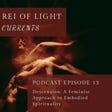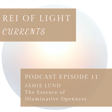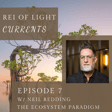Introduction to Nico Matsumura and Divine Embodiment
00:00:00
Speaker
I have my really good friend, Nico Matsumura, here with me and I'm so so excited because Nico and I have the most delicious and conversations that wander through the realms of spirituality and uh this wild existence uh that we call life and just excited to dive into um one of my favorite topics these days uh which we've touched upon in recent conversations uh which is just this idea of embodying the divine through this life right like through the work that we're doing in this world as opposed to it being this sort of like
00:00:44
Speaker
highfalutin, up and out of the body, you escape everything in order to engage it.
Spirituality in Business and Creativity
00:00:50
Speaker
um Because I think, you know, we are both people who work in the realms of business and creativity and and I feel like you're particularly I hold you as someone who um really embodies and lives your practice in all sorts of ways um but uh yeah through through all the various um avenues that uh you're expressing yourself so i was just curious to sort of dive into that um as a way of kicking us off and just
00:01:21
Speaker
curious you know what your thoughts are on this idea of embodying the divine, the practice you know in our day-to-day.
Japan's Spiritual Landscape
00:01:29
Speaker
But particularly, i mean I think business is an interesting domain that people don't really think of as spiritual so often, and I feel like we've had some fun conversations um in that. car I think the way that I'm hearing your words, I can relate it to the Japanese spiritual tradition, which is really a bit schismatic actually, right? Which is in the Japanese system, most Japanese are kind of tripartite. They're one third Buddhists and they're one third
00:02:09
Speaker
Shinto and their one-third atheist. And it's pretty much uniform. like It's pretty much that's basically
Transcendence vs. World-Embracing Paths
00:02:17
Speaker
all of Japan. you know And I'm being a little monolithic. I mean, there's Hindus in Japan and there's yeah there's all kinds of Christians in Japan. There's all kinds of people in Japan. But like you know on average, you'll find that that's the tendency. But the thing that I think I'm hearing is kind of this idea when you talk about embodiment.
00:02:37
Speaker
right is really that there's two broad directions of Eastern spiritual thought, right which is that there's the direction of transcendence, right which is an outward moving direction. right And generally those paths are paths that describe effectively like renunciates. So if you look at things like buddhism right yeah Buddhism is world renouncing as a function of its originator, right which is the ah Gautama Siddhartha who became the Tatagata. So he basically left his home, he left his son, he left his kingdom, his wife and his family. and you know So all of that is world renouncing.
00:03:21
Speaker
Right. And then when you look at the other spiritual traditions, you know, of the East, you know, in particular, if you this.
Shintoism's Nature Focus
00:03:30
Speaker
Sanatana Dharma, which is referred to as Hinduism, is is essentially more world-embracing, although you know within it's such a large set of traditions that there are absolutely kind of like monastic and world-renouncing traditions embedded right so you know within it. but So it's a very, very large umbrella, but within that umbrella, there's definitely world-embracing elements. And the thing that I've kind of lit into more recently is in studying the Japanese tradition, the Shinto element is the hidden element, which is that Japanese Shinto is a indigenous, atavistic and animistic
00:04:14
Speaker
and dare I say shamanistic tradition, right? And it's a tradition that really has very common themes across many, many indigenous spiritual systems, which is that it is actually much more about world
Shinto-Infused Advaitist Philosophy
00:04:33
Speaker
embracing, right? In a sense, it's the direct worship of nature which does not have to do with sort of the disconnection or transcendence, it has to do with kind of, ah you know, really ah connecting with nature, right? And so to me, you know, I think that's a different approach. And it's an approach that as I get older, I start to appreciate, which is, you know, I appreciate the aspect of, you know, because when you look at these two polarities of pop down and bottom up, you know, they they exist in most spiritual
Spiritual Complexity and Non-Dual Awareness
00:05:08
Speaker
systems, right? Like for example, when you look at Christianity, the
00:05:12
Speaker
Catholics have a more mediated and top-down approach, which kind of culminates in sort of a hierarchical system, which kind of scales beautifully in the form of a church, whereas the Protestant system is much more kind of bottom-up, where each individual has to sort of be grounded in their own sort of personal relationship with divinity. right so So to me, like it isn't unusual is it isn't unusual you know to see these emergent kind of patterns within spiritual systems. But you know to me, like I guess
00:05:44
Speaker
the The philosophy that I'm more embracing is certainly a, I guess I would say, a Shinto and-infused kind of Advaitist philosophy, which is that the non-dual awareness philosophers are really saying that it's actually neither imminent divinity nor transcendent divinity. right That it's actually not it's not dual So that's the kind of like principle of non-dual awareness is its sort of neither.
Nico's Personal Connection with Shintoism
00:06:13
Speaker
So anyhow, that's how I respond to kind of how you're ah sort of framing it. Yeah, fun. There's so much background in what you just said.
00:06:24
Speaker
It won't go too far and into it. If you're listening, just just go do your own research. But um I'm curious. I mean, I i think i part of where we connect is, you know, in that non-dual aspect. I mean, if you're living in this reality, it's pretty, it gets pretty tricky if you're just approaching it from a dualistic one. um But, and I'm curious like how this more focus or um look at the Shintoist perspective, that sort of animistic one was one oneness with nature, how it's coming to life in you know how you're experiencing the world,
00:07:04
Speaker
how you're doing things, maybe not at all, but I'm just curious like as you're deepening um your curiosity in this domain, um how- Yes.
Zen Buddhism and Nature Connection
00:07:14
Speaker
I mean, one of the fascinating things that typically happens with it outsider religious systems right is that they have this slightly annoying tendency to emerge as effectively like colonial.
00:07:28
Speaker
religions, or they they sort of try to smush the and indigenous religions, right? That's just a natural global tendency. But one of the really funny things is this sort of Japanese reverse appropriation, right, which is effective that what I'm learning as I get a little older, is that there's a way of looking at Buddhism as effectively a technology, right? And that it's the technology because when you look at the rise of Zen Buddhism,
00:07:57
Speaker
right is Basically, if you look at the tradition, the word Zen is actually the word Chan, which comes from China. right and so The fifth patriarch of Zen actually came to China, actually to the Shaolin temples. If you study Kung Fu, you know Bodhidharma. He was the patriarch. But he came to bring Zen in the form of Chan to China.
00:08:27
Speaker
But Bodhidharma did not know it as Chan. Bodhidharma knew it as Dyan. And Dyan is like the, it's really just the pure act of concentration.
Japan's Unique Spiritual Adoption
00:08:41
Speaker
So, you know, so I guess I would say this, is that going back to my original concept,
00:08:46
Speaker
One way of looking at the rise of Buddhism within Japan is that the indigenous pagans just found single-pointed attention to be a technology or a technique, right and that they appropriated the technique not for the original Buddhistic purpose of transcendence,
00:09:05
Speaker
but really for fixing their attention on nature itself, which is a really sneaky move. It's a sneaky move where you take an outsider religion and you just basically extract a technique from it and you say, thanks for the technique. Now we're going to go back to worshiping nature.
00:09:22
Speaker
Right, which is quite a, you know, so it's ah it's funny because oftentimes you'll see the appropriation going in the opposite direction or going in a reverse pattern. Right. So in this sense, the indigenous paganism is strangely intact. I think it's a facet of partly being on an island where somehow the indigenous paganism had survival. But I mean, if you look at if you look at something like ah like ah England,
00:09:51
Speaker
like England did not have that experience. right like Obviously, when you go to England, you will see indigenous shamanistic practices like the
Cultural Preservation in Spiritual Practices
00:10:01
Speaker
Celts. right So you definitely will see a lot of those things, but I will dare say that the things are kind of vestigial. right And i you know I don't want to denigrate, because I think those are really profound traditions. you know But when you see them as they rise in today's society, like you're going to see things like in the coronation of King Charles, you're going to see the stone of Skoon, the absconded or appropriated from Skoon Abbey in Scotland. right But this rock is actually like, it's an indigenous superpower. like This rock is what coronates the king, not
00:10:38
Speaker
right And the reason why is because the Anglican Church severed the ties up through the ah Catholic Church. right So in other words, like the power has to come from somewhere and it's coming from this rock that they like stole from the from Scotland. Stole is a maybe a bit of a mean word. It's a mean word because Robert the Bruce's bloodline comes back into England through, I think, James. So like it's it maybe it isn't. Maybe it's just the family heirloom.
Nature's Survival Strategies and Crypto
00:11:05
Speaker
But you know I would say you know I'm just really talking about where the power is. right And in all kind of like quote unquote Protestant systems, the power comes from the bottom up, for strangely.
00:11:18
Speaker
So as you're, I mean, one of the things that I love about, well, one thing that came to mind as you were talking earlier about um these different religious systems and technologies is actually kind of reminded me of a conversation you had a while ago and how you were describing, well, so you work in crypto.
00:11:38
Speaker
um And, and things but like crypto and and certain ah economic systems and or behaviors, also mirroring nature. And so it's coming up as you were talking earlier was I was reminded of that when you were talking about that in our last conversation.
00:12:00
Speaker
and so As you're mentioning like all of these different religious systems, I was wondering you know where and how you see that mirrored um in some of the you know the work that you're doing or what you're seeing or how how um systems are showing themselves to ah behave like nature or not and where that supports success or not.
Nature's Spectrum and Energy Equations
00:12:26
Speaker
Yeah, yeah. So nature, I mean, the thing that's really funny when you really contemplate nature is that there's sort of this incredible spectrum within it, right? So when you look at nature, there's kind of almost like a boring spectrum, right? Which is that there's a there's tons of nature that is just kind of like astonishingly tranquil and kind of boring seeming, right? Like a lot of the animal kingdom spends most of their time kind of just blankly staring or, you know, just really piecing out. And then on the other side of the spectrum, as you kind of slide the slider, there's just absolute savagery, right? Like in a sense, like, you know, organisms are, cause essentially all organisms are tasked with solving the energy equation, right? Which is that they need to take in more energy than they output.
Crypto Hackers as Natural Predators
00:13:22
Speaker
in the form of whatever it is they need to do to perform life functions. right uh you know whatever they're doing you know they need energy to do it right and so the thing that's interesting is obviously there are like there's rapacious predation right so there's the you know there's absolutely crazy there's parasitism like there's every single uh biomimicry mimicry is incredibly crazy like there's like blue butterflies that are poisonous to birds and then there's just these other blue butterflies that look exactly like them right and it turns out that
00:13:53
Speaker
it's energetically expensive to put enough poison inside of a butterfly's body to kill a bird. It turns out that's expensive. right And it turns out the one who's pretending is getting a free ride. like They're just getting a free ride. Birds don't eat either one right because they you know they're like, oh, that that killed my cousin. Or I felt really sick after I ate one of those. you know And so they just don't eat blue ones. right So I guess what I'm saying is like fakery, treachery, like rapacious, like all of that is part of the kind of like ah sort of cosmology and of the biosphere, right? So when you think about nature, one of the things that's crazy is just this very intense competition for energy, right? So, you know, because ah the point of it is is that every organism has one sort of equation
Consent and Competition in Crypto Systems
00:14:45
Speaker
They can't fail at this equation. Otherwise, they're, they cease being an organism, right? so So, you know, so they have to solve this equation. And that's it, right? So basically, the solutions to that equation are manifold, right? But when you look at crypto, like, are there fakers? yeah There's plenty of fakers, right? are Is there rapacious predation? Yes, there's rapacious predation, right? The thing that I think people need to also understand, though, is that the Predator is not the enemy of the herd. right The predator is really the enemy of the individual, not the herd. right So if a wolf is taking sheep, right if the sheep is killed, then that's definitely bad for the sheep. And the enemy is you know the wolf is the enemy. But the herd actually gets stronger. right so So if you were to apply that to crypto, think about hackers. It's like hackers. What are hackers doing? Hackers are hacking.
00:15:40
Speaker
what are they doing? They're solving a financial energy equation, right? They're taking in more, right? Like hacking costs energy, like it's they could be doing other things, right? And and so they're solving this equation, um you know, and the way they do it is effectively predatory, right? But the thing that I think is important is that this kind of pressure increases increases the hardiness of systems. right people so that So the defensive, in a sense, when you look at the evolution of the herd, the herd has to get faster. It has to get stronger. it has to Otherwise, there won't be a herd. like After a while, there will be no herd, and that's the end of the herd. So it's either adapt or perish.
00:16:22
Speaker
but So that kind of pressure is like very absolute. Now, is it optimal? I don't think it is. I don't think it's optimal. But I do think it's alternative. And what I mean by I don't think it's optimal is is that it it's reflective of a fully laissez-faire system. So it doesn't have the quality of human society or organization, you know, it's just basically people doing things. And obviously, the people who are doing crimes are doing crime. And like, that's, crime is bad. So like, you know, it's harmful. And, you know, it's crime, crime is not zero sum, it's negative sum, right? Which is like, that's why it's bad, right? In a sense, like, if you look at things that are positive sum,
00:17:06
Speaker
like things like technology building. right Technology some allows more people to solve the energy equation because there's creating more abundance of energy. right Whereas negative some games like crime are basically like not only is it zero sum, it's it's actually negative sum, right? Like that the whole system goes to a lower energy level. So it's so that that's you know so i'm I'm not taking a libertarian laissez-faire argument and saying it's optimal, right? But what I am saying is is that it is an alternative, right?
Morality in Generative and Economic Systems
00:17:40
Speaker
It's an alternative that people can elect. you know I do think that it's better if there's consent. And what I mean by that is, if you want to go into an arena and just bash it out,
00:17:55
Speaker
you should know that that's what you're doing. right like A lot of people go into crypto with very like innocent and then they get robbed. right And that's not consent. right That's deceit and that's treachery. and that's you know So to me, if you're going into crypto, you should know that it is raw is's a raw contest and that that you know you're in the arena now.
00:18:18
Speaker
there' is There's two things that are coming up for me that are kind of interesting um given context of our conversations. One is like, to your point, I mean, ah part of me is like, oh, well, is, ah you know, is positive some right, like generative actually just kind of inherently good and or like, you know, what where do the questions and sort of like morality or the human social social and or, you know, spiritual systems that might guide, right? Like that that kind of governance or things like that. But then also thinking about, um i I still think about all the time, your your stories and your um sort of come alluding to the Bhagavad Gita and the story of Arjuna.
Bhagavad Gita's Duality and Morality
00:19:04
Speaker
um And just this idea right that like you know we're all playing out this this mythic experience of ah ah duality, but also at the same time, non-duality, right which is that like everything is happening and that um there isn't necessarily like a quote, good, or bad, but the but an evolutionary process right that creates awareness or consciousness of different aspects. And that we're all playing certain roles um and that the I think if you were to frame it in the terms of the Gita, and I do want to kind of very be very specific or concise that it's my reading of it, right? Like that each person has their own Gita and their own reading, but you know in my reading there kind of is a moral lens, right? Like you know like it is fairly clear that the Pandavs are like
00:20:01
Speaker
good in quotes, you know and it's pretty clear. Obviously, there's really interesting frame tales in the Mahabharata where you realize that the Kauravs, the so-called evil ones, you know did get to Vaikunther. They got into heaven you know and that the so-called good guys didn't. and you know so yeah definitely There's a much bigger, bigger framing that's more complex than good
Krishna's Role in Restoring Dharma
00:20:26
Speaker
right but um you know But if you just look at it kind of behaviorally, right part of the lens has to do with the necessity that Arjuna put up a fight right in the sense that what's happening is that you know, in the story, essentially ah Vishnu takes the avatar form, which is something that Vishnu periodically does, right? And in in the kind of Vaishnava tradition, you know, there's supposedly 12 avatara, you know, including Korma, the tortoise, and Mattia, the fish, and you know, at the the dwarf. and And so there are many, many, many avatars, including Kalki, the final,
00:21:10
Speaker
incarnation has yet to arrive. but And in some tellings, the Buddha was one of the incarnations, a very interesting telling. But I would say that like you know the form of Krishna is similar in many avatar forms in the sense that the job of Vishnu is to sustain the world, right? So basically what happens is that when the world gets out of whack, that's why Vishnu takes the form because what's happening is that there's a boundary. And I think this is the boundary that I think is so significant, which is in the, so not in a Dharma, there's a very nice Sanskrit word called avyaktam. And avyaktam is the unmanifest, right? And then,
00:21:58
Speaker
Vyaktam is, of course, the manifest. And this boundary is a pretty important boundary. And there and it's that boundary is crossed for a reason. So you know when Vishnu takes the form of Krishna, it's basically moving from the unmanifest to the manifest. right And then the purpose is essentially this concept of restoring dharma, restoring dharma. And dharma has many translations, but I would say duty, but also nature and also law. So like law, duty, nature. In Buddhism, it means teaching, but it's a little different. It's not, it's not, it doesn't quite mean the same. So Dharma comes back into this idea of, you know, nature because there's this two kinds of nature, right? There's what I referred to earlier, the Sanatana Dharma, which is the universal nature represented by Krishna. And then there's the individual nature.
00:22:56
Speaker
represented by Arjuna. So I think what what you're alluding to is that when you are the peak embodiment of your own personal nature, that you experience this unification with the universal nature.
Personal Dharma and Universal Nature
00:23:11
Speaker
ah Because really, when you think about what happens in the story action of the Gita is that in the Mahabharata, right after the Gita, it forms the Voltron, which is basically you have ah a chariot, which is a machine, and then you have an archer who's a human, and then you have horses who are animal, and then you have a driver who's a god, right? So you have this kind of cybernetic Voltron that kind of is formed out of really the kind of this
00:23:50
Speaker
it's almost like a contract which is what I call you shoot all drive which is effectively that that's the deal that's forged in the Gita right which is the deal is is if the individual performs their individual dharma everything else is outside of their pay grade like everything else is so so in some ways just taken care of right that's the kind of ideal which is that the idea that Krishna is driving the chariot is the idea that when you are fully expressing your nature, there's no difference between your nature and nature. ah her Beautiful. There it is. this out yeah that's the That's the link.
Arjuna's Conflict and Spiritual Misconceptions
00:24:34
Speaker
So I'm curious um because
00:24:38
Speaker
in part so So part of the story right is that Arjuna is an archer and that he you know needs to go into battle, but he's conflicted because that would mean that he would need to fight his family. And so he says, i'm not I'm not going to be an archer. I'm going to do the good thing, the moral, righteous thing, and not do anything against my family. And the story goes that you know it's actually his his his dharma, his duty. He he is an archer. Yeah, correct.
00:25:07
Speaker
correct and yeah And the irony is massive. The irony is giant. but The irony is giant because he's like he's like giving his little TED talk on Dharma.
00:25:18
Speaker
like He's basically like, he's basically like, ah so the term that's used is Adarm, Adarm, right? Which means against Dharma, right? And he says, killing your cousins is Adarm, right? Like killing my archery teacher, Jerona, is Adarm, right? So hes he's basically like giving this little mini TED talk on what is Adarm. And the one he's telling this to is the embodiment of Vishnu, like is Dharma like it embodied, right? And so it's just like,
00:25:48
Speaker
Really? like that's That's what you got? like So you know so he's he's definitely um like he definitely doesn't he doesn't have the big picture. like you know And that's that's why that's why this avatar manifestation has had to exist. right because this um Because the purpose is to restore DARM and the instrument was arch enough the instrument, which is the best archer in the world, was needed. it's like then Not only needed as kind of like, hey, come do this thing, like needed as an archer. like It's like, no, no, no, we need you to not be a slacker. We need you to be an archer. like like That's what we need you to be. And it's sort of like, oh, that's interesting.
00:26:35
Speaker
And that's where I feel like, you know, for for those listening and ah one of my sort of, I don't know, in the spiritual world these days, I think there's um a a desire to sort of be good or be, you know, a guru or to leave everything and, you know, you know, be sort of holier than thou. And what I love about this story is like, no, we need you to be an archer,
Fulfilling Dharma and Duty
00:26:56
Speaker
you know? And so, you know, whatever it is, like we need you to be the finance guy or we need you to be the teacher or the artist or, you know, whatever it is,
00:27:05
Speaker
um I feel like it's important for people to know that like you are you. You have your specific gifts for a reason. and that you know If you let God drive, essentially, per the Arjuna story, right like then you can you can be the archer who's needed to set to to realize the Dharma. You don't have to leave your nature right in order to sort of be good or achieve some something better than you being you.
00:27:37
Speaker
Yes, yes, absolutely, absolutely. ah One of the examples in this, right, is basically that there is a pretty amazing archer fighting for the, you know, the bad guys, fighting for Duryodhana, named Karna, right? And there's a wonderful scene in Mahabharata where Draupadi, the princess, is having this swayambar, which is almost like a contest, right? Some kind of Olympic Games, right? And Karna is a great archer, so he kind of wins prizes and whatnot. And she spurns him. She's basically like, you suck because your father was an archer. Now, little did she know that his father was actually Surya, the sun god, right? And that and that Karna was actually a Pandav, was actually the eldest brother of Arjuna, right? She didn't know any of these things. She just thought because his adoptive father
00:28:43
Speaker
was a charioteer. And here's what I'm trying to tell you. What I'm trying to tell you is, is she's saying, you're a scumbag and you're not worthy of me because your father was a charioteer. The exact role that Krishna chose.
00:28:58
Speaker
perform on earth right and you know the charioteer has to put the little staircase down so that the rider can like you know like so that is at the feet of the rider like it's definitely like a uber driving type of a function like it's not it seems glorious and elegant and beautiful and magnificent if you look at the pictures but like they weren't treated that way you know and so In a sense, that's something that the deity is saying through action, right is is saying, like you should do your dharma, like you should do your duty. like it's Because duty is the other word.
Aligning with Dharma and Chan Awareness
00:29:40
Speaker
right Nature, duty, these are all law. like They're all entwined into this kind of power word.
00:29:47
Speaker
So I'm curious, you know, I think I have a curiosity though, I'm more curious how you experience how this comes to life in you and your work, um your experience of it. And I'm thinking back to the Chan technology, right? I have a feeling that it has to do with it bringing that, you know, Chan awareness into the presence of you know who you're who you're being and what you're doing or what you're experiencing. But I'm curious you know how it is that you know what your dharma is or how you stay aligned to it or how it is that you know you're not just shooting your shot at random but that you are on the chariot, right?
00:30:31
Speaker
Um, because I think that, uh, I think it's also easy to spiritually bypass and say like, well, this has got what God wants me to do, you know, or whatever, whatever spiritual affiliation you have, you know, um, whatever you would call that spirit, the universe, ah ah whatever. Right. Um,
00:30:48
Speaker
that this is this is what I'm supposed to do. And um so I'm curious how you find that rightness right of um your own personal nature and how it expresses in the world um and or just you know how how you how you experience this.
Archery Metaphor in Spiritual Alignment
00:31:11
Speaker
I mean, I think i think it might it might be like this, right? Which is like,
00:31:17
Speaker
ah you know, like if you drop a ah stone into a body of water, like it does this weird wobbly path, right? And in a way, like, it's sort of this is what I'm really saying is, is that I think there isn't a principle of kind of universal alignment, because of the necessity that we have limited understanding, right? So in a sense, I feel like a human is someone who is kind of constantly flowing
00:31:48
Speaker
into and out of alignment. right and you know So I think that that the thing that's important is kind of this idea of the mark. right like And when you think about the mark, this mark is super interesting, right hitting the mark. right Because there's a wonderful scene where the archery teacher, Drona, is teaching all the cousins, including Arjuna.
00:32:13
Speaker
and He asks different characters, Esther Yodna, like, hey, I placed a stuffed parrot in a tree. What do you see? He said, I see a stuffed parrot. And he's like, next. And then I think it was Bima, yes. Hey, what do you see? And he said, I see a stuffed parrot sitting in a tree. And then he's like, next. And then he's like, Arjuna, what do you see? And Arjuna's like,
00:32:41
Speaker
I see only an eye." And then he's like, then shoot, shoots, pulls eye, like everything, you know? And it's sort of like, whoa, right? And and when you take the metaphor of archery, right? That's the idea, right? The idea is the aspiration, right? And this concept of ah of a hitting the mark has echoes across many spiritual traditions, right? Like if you go to,
00:33:10
Speaker
the Christian tradition, the word sin actually was what the archery coaches would say when the arrow missed the center of the, they would say sin, like, because the arrow is not on the target, right? And that's the idea. is The idea is, what's the difference between what you did and what would have been on target? And in a sense, the Christian tradition has the example of Jesus, right? So the example of Jesus is, that's what you should have done, right?
00:33:40
Speaker
And what is sin? Boom, it's the distance. It's like, well, you were off pretty close, actually. you know You could have done it a little bit better. right So to me, this idea of aspiration is really important. The other echo of this idea comes out of Buddhism. So people mistranslate the first noble truth as life is suffering. That's the mistranslation, dramatic mistranslation. The original Pali is Saka Dukkha. So Saka is when you go back into Pali, it's the same thing as Satya, which is the truth in Sanskrit. And Dukkha is Dukkha. Dukkha is the same in Pali or Sanskrit. But what is it? What is Dukkha? What is the truth of Dukkha? It's not Saka. It's Dukkha is space.
00:34:34
Speaker
And Du and Su, if you remember that character I mentioned before, Duryodhana. Du means like bad, basically. So his character name is like bad guy or whatever. It's pretty funny. But um this concept of nuka is this concept of the bad space.
00:34:52
Speaker
and it's like I thought space was empty. How could space be good or bad? right Doesn't work like this. It actually has to do with crafting a wheel. right And what happens is, where do you put the hole for the axle? Put the hole for the axle. And the thing that's really amazing is that the language is so great. Because when you're doing things like making sure that the alignment exists for a bicycle wheel,
00:35:18
Speaker
right? It's called true and the verb form is truing, right? Like you're, I'm truing this wheel, right? And the idea becomes Dukkha is only the whole of the axle being off the center of the wheel. And the difference between the East and the West is that in the West, it's sort of archery is like this one shot, right? But in the East, it's circular and it goes around and around, right? And the thing that, that what it's saying by the,
00:35:48
Speaker
truth of Dukkha is that The axle wasn't placed perfectly in the center of the wheel, and now your cart is effed up, and it's just going down the road wrong. And that's it. And like that's what it's like. And so in a sense, I feel like it's better to say that it has a endemic dissatisfaction quality, right rather than it
Living Authentically and Spiritual Challenges
00:36:11
Speaker
is suffering. like That's not OK. That translation isn't OK. It's bad. It's a bad translation. Do translation, not sue.
00:36:22
Speaker
Oh, amazing. So I think, I think we're at time. So I want to be respectful of your time, even though I talked to you forever. um I guess just in closing.
00:36:37
Speaker
um you know i think I think some of the people who are listening, I think one thing that might be helpful is just considering what that truing looks like, feels like, um and what it is that that you know sort of, what is it to live an authentic expression of your dharma or your duty or your um nature, right? It's such a broad,
00:37:07
Speaker
Statement, i I think that- Yes. Yeah, because, right, there there are certain parts of our nature that are, quote unquote, untrue, and yet those are part of our nature. um I think this, I think this, right, which is it definitely feels vibrant. It feels energetic, right? But it also feels uncomfortable.
00:37:34
Speaker
Oh, that's my feeling. That's how I experience like, it's because the problem is, is that like, in a sense, like, the idea of a wheel is the idea of opening, right? So it's idea of kind of like, you create an opening for the axle, right? And this kind of like, sense of like, the world is one where you're constantly having to recalibrate and adjust what your model is of the world, which means that things are constantly like breaking and falling apart. and you know And the other ways of looking at dukkha are things like entropy or things like friction or things like misalignment. I mean, misalignment is really the most fundamental part of that visual metaphor, and which is that untruthness.
00:38:20
Speaker
you know and i think that um that discomfort I think is endemic. So, you know, I think despite the vibrancy and the excitement and the aliveness and the wakefulness, right? To me, it's sort of like, if you are wakeful, then you're uncomfortable because you have to see things that you don't want to, and you have to see things that aren't the greatest things.
Exploring Spiritual Traditions and Conclusion
00:38:44
Speaker
Because like, there's tons going on that are not the greatest things. And like, seeing those things isn't fun or or nice.
00:38:52
Speaker
okay But they're true. Yeah, correct. Correct. That's part of like being kind of wakeful, is looking at things that you don't want to. Thank you so much, Mikko. Is there anything else you want to share that I didn't ask or that you just feel like? and I just wanted to encourage folks that um You know, I think a lot of what I've been talking about have been sort of the combinations of spiritual exploration, you know, and it's really been my sort of exploration of the traditions, you know, from Japan and kind of traveling further east and realizing that Buddha was an Indian guy and, you know, trying to figure out what that means, you know, and he that he was scholarly actually in the Vedic tradition.
00:39:46
Speaker
you know And so you know there's a lot of depth to understanding Eastern spiritual thought. you know and To me, like I think one of the things that Dalai Lama said that was kind of fun was he really said that he really doesn't need people to come to Tibetan Buddhism per se. right And that he was kind of more in favor of people embracing whatever they were kind of grown up in, you know oh which is kind of cool. But like I don't know, in my experience, like In order for me to see the things and the richness of the tradition that I was born into, you know I kind of did have to travel and and you know go even further East and then like you know ah from the perspective of Europe, ah you know from the perspective of Japan further West ah and and discover some of that. I just would encourage people to think about their quest in such a fashion.
00:40:46
Speaker
Thank you so much, Mikko. So fun. Yeah, it's always fun. And we'll talk to you again soon. Thanks for listening, everyone.














